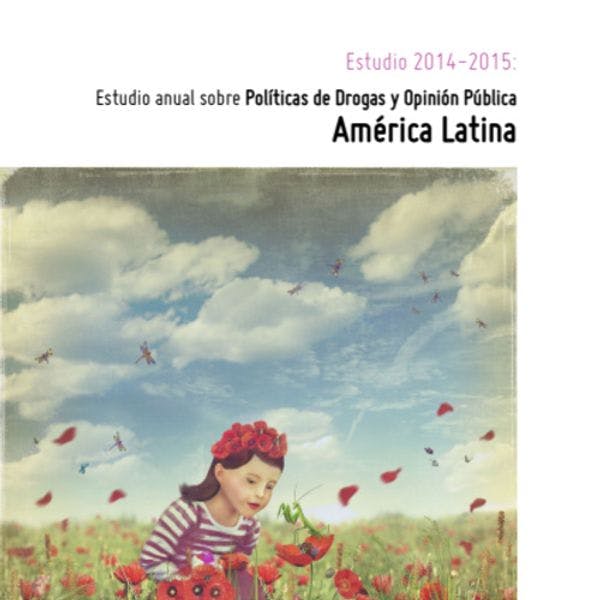Annual study on drug policies and public opinion in Latin America 2014-2015
Approval rates for therapeutic uses of marijuana have increased from 57% to 65% among Latin Americans, especially in Chile, Colombia, and Uruguay. Additionally, a majority of Latin Americans consider alcohol and tobacco to be more dangerous than marijuana, as decriminalization measures gather support in Mexico and Colombia.
These statistics have been laid out in the Latin American Drug Policy Observatory’s (OPDOP) latest study. This study is the first and only barometer fully dedicated to drug policy in Latin America and is carried out in conjunction with key research centers in the region such the Centre for Research on Drugs and Human Rights, the Centre of Quantitative Studies of the University of Santiago, the University of the Andes, the Friedrich Ebert Foundation and the Costa Rican Association for Drug Studies and Interventions (ACEID), among others.
According to the barometer, 67% of Latin Americans perceive a rise in drug trafficking over the last 5 years and more than 75% recognize an increased availability of drugs (marijuana, cocaine, and others) on the streets. Within this context, there is a rough equilibrium between positions that understand drug consumption as an issue of public safety and those who understand it as a public health issue. Mexico is the country where most of the population is highly critical of police and military interventions while Bolivia and El Salvador are the most conservative states on that topic.
Witnessing the failure of current drug policies, people are demanding alternative strategies. Decriminalizing and legalizing the production, commercial distribution, and consumption of drugs are currently widely accepted among Mexicans (72% of young people back the regulation of consumption) and Colombians (support for the regulation of consumption has doubled), but not among Argentines and Bolivians. At the same time, the marijuana regulation model in Uruguay, where 68% consider drug consumption to be an individual right, loses popularity ratios in all countries when compared to last year. This has taken place despite the fact that Uruguay has the lowest rate of criminal acts tied to drug consumption in the region (54% compared to an average of 74%).
With these results, OPDOP analysts have criticized the prohibitionist approach since “it has led to more violence in the region without fulfilling its objectives of reducing drug consumption, while disproportionately targeting the youth. Increased support for drug policy reform goes hand in hand with a greater demand for alternatives like decriminalization and market regulation, which would incorporate policies that attend to a more critical and informed population.”
At the same time, Eduardo Vergara highlights the need to improve the quality of education and prevention measures since many countries have implemented policies guided by political agendas, moralistic attitudes, and business profits. “For many years, terror campaigns against drug use have polarized the debate and have taken away valuable room for legislation based on evidence and our countries’ social realities. It is necessary that both institutions and actors fueling the prohibitionist discourse offer a mea culpa for all the damage they have caused to millions of Latin Americans.”
This support for a paradigm shift concerning drug policy is coming at a time when multiple Latin American countries are about to play an important role in the upcoming discussions at the United Nations General Assembly Special Session in April of 2016, when the General Assembly will come together to discuss new approaches to international drug policy.
Results of the study:
- 83% of Chileans claim that marijuana availability has increased from the previous year.
- 72% of young Mexicans support decriminalization or legalization of drug consumption.
- 43% of Colombians say that drug production should be decriminalized or legalized, showing a significant increase from 2013-2014 when only 20% favored this option. Additionally, Colombia is the only country in the region in which public opinion shows that the majority agree that drug trafficking has not increased in the last 5 years.
- 87% of Argentines claim that cocaine availability has increased in the last year and 55% consider police interventions and persecutions to be ineffective strategies to reduce drug consumption. However, support for decriminalization or legalization of drug consumption has fallen from 74% to 50% among young people in Argentina.
- 97% of Bolivians perceive drug consumption as a social issue, but only 2% claim to have consumed marijuana in the past month and 2%, cocaine paste or cocaine at some point in their lives.
- 61% of young Costa Ricans believe drug consumption should be decriminalized or legalized and 46% consider military interventions to be an ineffective strategy in the fight against drug trafficking.
- 68% of Uruguayans say that drug consumption should be considered an individual right.
- Only 1% of Peruvians claim to have tried cocaine of cocaine paste at some point in the last year. 75% of them admit to have worked under the influence of these substances.
- In El Salvador, there is a growing perception that police interventions and persecuting consumers are not effective policies to reduce drug consumption.
The report is available below in Spanish.
Keep up-to-date with drug policy developments by subscribing to the IDPC Monthly Alert.
Downloads
Topics
Regions
Related Profiles
- Asuntos del Sur
